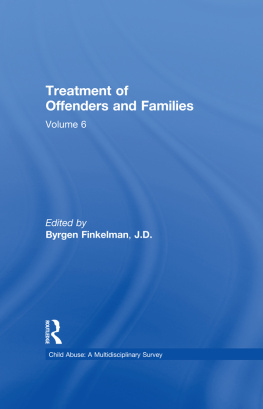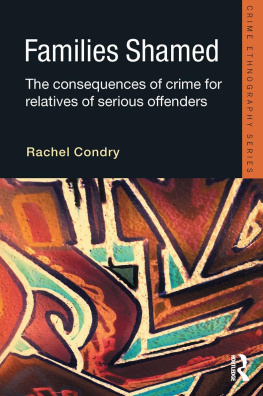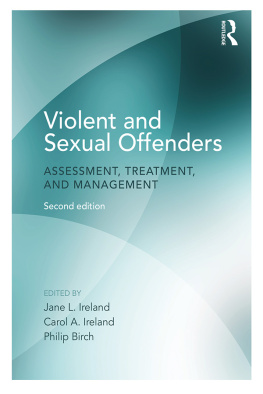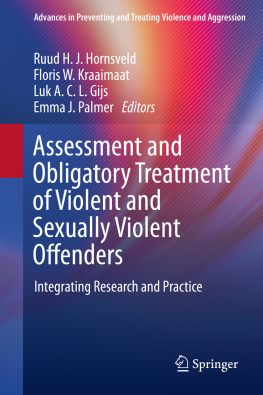CHILD ABUSE
A Multidisciplinary Survey
Series Editor
BYRGEN FINKELMAN, J.D.
SERIES CONTENTS
1. PHYSICAL AND EMOTIONAL ABUSE AND NEGLECT
2. SEXUAL ABUSE
3. CAUSES, PREVENTION AND REMEDIES
4. SHORT- AND LONG-TERM EFFECTS
5. TREATMENT OF CHILD AND ADULT SURVIVORS
6. TREATMENT OF OFFENDERS AND FAMILIES
7. PROTECTING ABUSED CHILDREN
Protective Services and Proceedings, Foster Care, Termination of Parental Rights
8. VICTIM AS WITNESS
Legal and Psychological Issues
9. PERPETRATORS, VICTIMS AND THE COURTS
10. CHILD ABUSE LEGISLATION
Reporting Laws, Standards for Intervention, Passive Abuse, Fatal Abuse
VOLUME
TREATMENT OF OFFENDERS AND FAMILIES
Edited with introductions by
BYRGEN FINKELMAN, J.D.
Introductions copyright 1995 Byrgen Finkelman, J.D.
All rights reserved
First published 1995 by Garland Publishing, Inc.
This edition published 2013 by Routledge
711 Third Avenue, New York, NY 10017
2 Park Square, Milton Park, Abingdon, Oxon, OX14 4RN
Routledge is an imprint of the Taylor & Francis Group, an informa business
Library of Congress Cataloging-in-Publication Data
Child abuse : a multidisciplinary survey / series editor, Byrgen Finkelman.
p. cm.
Includes bibliographical references and indexes.
Contents: v. 1. Physical and emotional abuse and neglect v. 2. Sexual abuse v. 3. Causes, prevention, and remedies v. 4. Short- and long-term effects v. 5. Treatment of child and adult survivors v. 6. Treatment of offenders and families
ISBN 0-8153-1813-8 (v. 1 : acid-free paper). ISBN 0-8153-1814-6 (v. 2 : acid-free paper). ISBN 0-8153-1815-4 (v. 3 : acid-free paper). ISBN 0-8153-1816-2 (v. 4 : acid- free paper). ISBN 0-8153-1817-0 (v. 5 : acid-free paper). ISBN 0-8153-1818-9 (v. 6 : acid-free paper)
1. Child abuseUnited States. I. Finkelman, Byrgen.
HV6626.52.C54 1995
In 1960 Elizabeth Elmer said of child abuse little is known about any facet of the problem and that methods for dealing with it are random and inadequate. She spoke of a professional blind-spot for abuse and of the repugnance felt by most of our society for the entire subject of abused children.1 Two years later, Dr. C. Henry Kempe and his colleagues brought national attention to the problem of child abuse with their article, The Battered-Child Syndrome.2 Prior to the publication of that landmark article, the literature on child abuse was almost non-existent. In the three decades since its publication, the research and literature on child abuse have become vast and daunting.
Social workers, psychologists, psychiatrists, counselors, and doctors have studied child abuse in great detail. As a result, we know that child abuse includes physical, emotional, and sexual abuse as well as neglect. Researchers have studied the causes of abuse from both the individual and societal perspectives. There are effective interventions for tertiary remediation of the problem, and there are many prevention models that hold out hope that child abuse can be stopped before it starts. Studies of the short- and long-term effects of child abuse show a range of maladies that include infant failure-to-thrive, learning disabilities, eating disorders, borderline personality disorders, violent behavior, delinquency, and even parricide. We now recognize the need for treatment of child victims, adult survivors, and adult perpetrators of all forms of abuse. Lawyers, legislators, and judges have grappled with the profusion of legal problems raised by protective services and proceedings, foster care, and the termination of parental rights to free abused children for placement in permanent homes. Legislatures have passed and amended statutes requiring various health, education and child care professionals to report suspected abuse, and they have dealt with the difficult problem of defining abuse and determining when the state should intervene to protect children from abusive parents. They have also struggled with the legal and psychological issues that arise when the child victim becomes a witness against his or her abuser. Even the Supreme Court has been called upon to sort out the constitutional rights of victims and criminal defendants and to determine the extent of government liability for failure to adequately protect children from abuse.
The articles in this series document our passage through five of the six stages that C. Henry Kempe identified in his 1978 commentary Recent Developments in the Field of Child Abuse as developmental stages in addressing the problem of child abuse:
Stage One is denial that either physical or sexual abuse exists to a significant extent Stage Two is paying attention to the more lurid abuse Stage Three comes when physical abuse is better handled and attention is now beginning to be paid to the infant who fails to thrive Stage Four comes in recognition of emotional abuse and neglect and Stage Five is the paying attention to the serious plight of the sexually abused child, including the youngster involved in incest
In spite of the voluminous research and writing on child abuse, the sixth and final of Kempes stages, that of guaranteeing each child that he or she is truly wanted, is provided with loving care, decent shelter and food, and first class preventive and curative health care, remains elusive.3 There are many explanations for our inability to conquer the problem of child abuse. In reality, the explanation for our continued inability to defeat this contemptible social problem is as complex as the problem itself.
We continue to sanction the use of violence in the name of discipline. We put our societal stamp of approval on punishment inflicted by way of correction and training and call it discipline. But discipline also means instruction and exercise designed to train to proper conduct or action.4 It is not difficult to see the inherent conflict in these two definitions when applied to childrearing. How can we train to proper conduct or action when we use physical punishment as a means of training, punishment that we would not inflict upon an adult under the same circumstances?
The courts and legislatures have been unable to find the correct balance between a familys right to privacy and self governance and the need of children for protection. We are unable or unwilling to commit sufficient revenue to programs that combat abuse.
There is also the tendency among many professionals working with abused children and abusive parents to view the problem and solution through specialized cognitive lenses. Doctors, social workers, lawyers, psychologists, psychiatrists, counselors, and educators are all striving to defeat child abuse. However, for the most part, these professionals focus on the problem of child abuse from the perspective of their own field of expertise. The literature on child abuse is spread throughout journals from these fields and in more specialized journals within these fields. It would be impossible for any single person to remain abreast of the developments in all other disciplines working toward a solution to child abuse. But it is also patently clear that the solution to the problem of child abuse is not going to come from any one individual or discipline. It is going to take professionals and lay people from all disciplines, working with knowledge from all disciplines.







